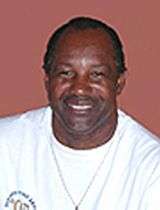Benny Barnes
|
Benny Barnes, at Contra Costa College | |||||||||
| No. 31 | |||||||||
|---|---|---|---|---|---|---|---|---|---|
| Position: | Cornerback, Safety | ||||||||
| Personal information | |||||||||
| Date of birth: | March 3, 1951 | ||||||||
| Place of birth: | Lufkin, Texas | ||||||||
| Height: | 6 ft 1 in (1.85 m) | ||||||||
| Weight: | 190 lb (86 kg) | ||||||||
| Career information | |||||||||
| High school: | Richmond (CA) Kennedy | ||||||||
| College: | Stanford | ||||||||
| Undrafted: | 1972 | ||||||||
| Career history | |||||||||
| * Offseason and/or practice squad member only | |||||||||
| Career highlights and awards | |||||||||
| |||||||||
| Career NFL statistics | |||||||||
| |||||||||
| Player stats at PFR | |||||||||
Benny Jewell Barnes (born March 3, 1951) is a former American Football cornerback who played eleven seasons in the National Football League for the Dallas Cowboys. He is most famous for a questionable pass interference in Super Bowl XIII on Pittsburgh Steelers wide receiver Lynn Swann.
Early years
After attending John F. Kennedy High School of Richmond, he moved on to Contra Costa College where he was an all-conference linebacker for the football team and also an all-conference track and field athlete.
In 1970 he transferred to Stanford University where he was converted from linebacker to safety, becoming a two-year starter and part of the “Thunder Chickens” defense, that was very effective (9 of their 11 starters ended up playing professional football). He was an All-Pacific-10 Conference selection as a senior.
He helped teams led by Jim Plunkett in 1971 and Don Bunce in 1972 to two of the biggest upset victories ever in the Rose Bowl.
Although he played just two years, he was inducted into the Stanford Athletic Hall of Fame and selected to the Stanford's All-Century Team. In 2011, he was inducted into the California Community College Athletic Association Hall of Fame.
Professional career
Dallas Cowboys
In 1972, he was signed as an undrafted free agent by the Super Bowl champion Dallas Cowboys, and made the team based on his excellent special teams play on punt and kickoff coverage. By the end of the 1974 season he was a starter at right cornerback, but suffered a broken right ankle playing against the Cleveland Browns, an injury that would affect him the rest of his career (three surgeries).
Although he didn't have great athletic ability, he played hard and made plays, regaining in 1976 the starter position at left cornerback. In 1977 he was the starter for the Super Bowl XII winning team.
His best season came in 1978, when he led the team with 5 interceptions, while still excelling on special teams. In Super Bowl XIII he was involved in one of the most controversial calls in Super Bowl history, when Lynn Swann ran up his back and both fell, resulting in a pass interference that gave the Pittsburgh Steelers the ball deep in Cowboys territory and an eventual crucial touchdown.[1]
In 1980, the Cowboys struggled with Barnes (6 games) and Steve Wilson (10 games) sharing the left cornerback position, so the next season he was moved to strong safety to make room for undrafted free agent Everson Walls.
Barnes was waived in 1983 at the end of training camp, and replaced with undrafted free agent Bill Bates.[2]
Oakland Invaders (USFL)
On January 14, 1984, he signed with the Oakland Invaders of the USFL, reuniting with John Ralston his former Stanford University coach.[3] He was released before the season started.[4]
Barnes retired after an 11-year career, where he was part of 8 NFC Championship Games and 3 Super Bowls. He is considered to be one of the best special teams players in Dallas Cowboys history.
Personal life
Barnes spent some time investing in restaurants and worked at Contra Costa College as equipment manager.[5] He is currently married, with three sons and one daughter.
References
- ↑ https://news.google.com/newspapers?nid=1144&dat=19790223&id=4OAeAAAAIBAJ&sjid=LFkEAAAAIBAJ&pg=4006,2923015&hl=en
- ↑ https://news.google.com/newspapers?nid=861&dat=19830828&id=ErNjAAAAIBAJ&sjid=P4EMAAAAIBAJ&pg=2840,7495062
- ↑ https://news.google.com/newspapers?nid=1842&dat=19840115&id=jVweAAAAIBAJ&sjid=sscEAAAAIBAJ&pg=2644,2982519&hl=en
- ↑ https://news.google.com/newspapers?nid=1665&dat=19840221&id=GLMjAAAAIBAJ&sjid=nyQEAAAAIBAJ&pg=4552,6468029&hl=en
- ↑ http://nflretirees.blogspot.mx/2006/08/for-former-football-pro-its-all-about.html
